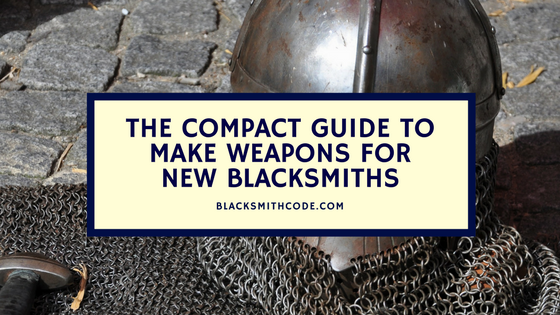Hello there, blacksmith weapon making, as any aspect of blacksmithing, is an art that requires a lot of patience, skill, and determination. In spite of how weapon making has been portrayed in films, it is a bit more complicated than that and you actually have to work hard to become really skilled at it. But before you get to hard work part, you do need to learn a few basics first.
It would be best for you to read a lot of books, watch a whole lot of tutorial videos online, and if possible attend a basic set of shop classes. You should first get a hang of blacksmithing as a whole before you start trying to forge blacksmith weapons. This whole process should take you a couple of months, at least. Afterward, make the effort to attend a blacksmithing fair close to you and talk to anyone who is willing to talk to you. Ask about their experiences, ask for small tips (that can only be gotten from experience) and of course, ask them for advice on weapon making.
Start Small
In spite of how tempting it might be to jump right into making swords, it will be advisable to start small. Forging a sword takes skill, precision and time, Don’t waste your materials on trials and errors when making blacksmith weapons. So, start by making small knives first. Then you can move on to bigger knives and practice, practice, practice. You should do this for months before you attempt your first sword. Judge your work. Ask a more experienced smith to rate you. You will know when you are ready to make bigger weapons.
Join a sword forum
These forums will help point you in the right direction, particularly to form complex materials like blacksmith weapons. Even though you are not sure what questions to ask, you will find a lot of previously asked questions that will prove to be beneficial to you; and as time goes on, you will have yours and they will be more than willing to help you.
Safety First
Another very important point to remember is safety, especially when forging blacksmith weapons. It is, in fact, the most important aspect of all. Invest in quality safety gear, especially gloves and safety glasses. Safety is not just about protecting your hands and eyes, but it also includes management of the fumes and ensuring that no damage is caused by the forge. Safety also involves knowing your metal and knowing which ones are safe for forging and which ones are not. For example, you should never forge any metal with zinc in them because they give off dangerous toxic fumes. Galvanized metals have zinc in them, so these should not be forged.
Get The Right Tools
Finally, get yourself a hammer, a small anvil, and a small forge. After adequate practice, probably after about 8 months- a year, you should feel more confident on what type of anvil would best suit your needs. Then, just go ahead and keep practicing. Stick to small knives and blades. Blacksmithing is an intuitive process, so just go with your instincts. There are many resources, tips, and techniques you can learn as time goes on, but for now, it will be best to stick to the basics, including forging blacksmith weapons.

